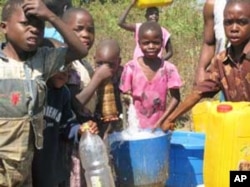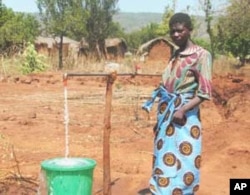It's tradition in Malawi for women to find water for the household. But, it's a task that's harder than it seems for the women in the Thambani area in the southern district of Mwanza. They carry back from a river three kilometers away.
It's not only far away, but risky.
“[Sometimes] we had to wake up every day sometimes one or two o’clock in the morning to go and collect water. There were so many risks," says Grace Chiwaula.
You see, sometimes we meet witches and snakes on the way. Even hyenas have been chasing us. At times we've had to go to streams accompanied by men because of these hyena,s and we're afraid they would eat one of us one day.”
Chiwaula, a mother of three, says women also do not feel safe bathing in the river. She says sometimes youths hide in nearby bush and harass them.
“[Young men] would come there and sneak to see us naked. This had been a major embarrassment. We complained to the chiefs about it. They punished some of them, but you know they [also] would sometimes climb trees just to look at older women like us taking a bath,” explains Chiwaula.
Now that’s history. The women are collecting water just a stone’s throw from their homes, thanks to a new water and sanitation program that provides residents with tap water. They can bathe in privac, instead of going to the river.
MacLean Chimpeni is the coordinator for the project in Mwanza district, which is funded by the NGO ActionAid. He points out the first challenge was to find the water source that would last year round.
“Through discussions with people we noted that there were perennial streams that we would tap water from. So we mobilized some resources, some money and mobilized people to work together with them to set up gravity-fed scheme. We also supported the people with money to buy cement and other construction materials to put up concrete tanks,” says Chimpeni.
The tanks distribute water to thirty water taps benefitting 4,000 households.
An impact assessment shows that nearly all of the population in the area has access to safe drinking water, compared to less than 20 percent before the project was implemented. The report says water collection points are now less than half a kilometer away, compared to three kilometers before.
“We are extremely happy with this water initiative because it has saved us from the problems were facing when we were collecting water from the river, and also with this clean water we no longer suffer from waterborne diseases like cholera, dysentery and bilharzias as was the case in the past,” says Gladys Chagwa, one of the beneficiaries.
Project leaders aim to make the improvements last a long time. To be sure, Chimpeni says ActionAid is training some people to repair broken taps, while others have volunteered to guard the spigots against vandals.









